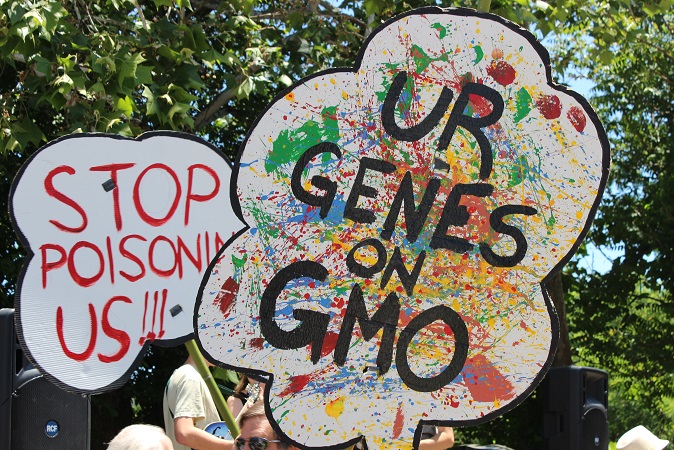
First off, let’s start from the beginning. What is a GMO?
GMO stands for “genetically modified organism.” It is an organism whose DNA has been artificially altered in a laboratory. As an example, some plants have been genetically engineered to tolerate exceedingly high amounts of herbicides & insecticides, which are extremely detrimental to our health & the environment.
Quickly taking over supermarket shelves, GMOs are now contained in as much as 80% of conventional processed food.
Many countries (more than 60), including Japan, Australia, & Europe, have realized the dangers of GMOs and have heavily restricted or banned them entirely. Sadly, in the United States GMOs do not require safety testing and are not even required to be labeled.
Who is behind these genetically engineered crops? The main culprit is a company called Monsanto– and they rake in billions of dollars each year by keeping these frankenfoods in the food supply.
This past Saturday, May 23rd, people took to the streets in over 400 cities all over the world to participate in the annual March Against Monsanto to voice their concerns.
Here are some photos from the march that I participated in in Asheville, NC.
When I arrived to Pack Square in downtown (the meeting place for the march) it was already full with people waving their signs at the traffic.

Organizers of the march provided poster board and markers for anyone joining to make their own sign if they hadn’t brought one from home. Here I am in the crowd making mine.
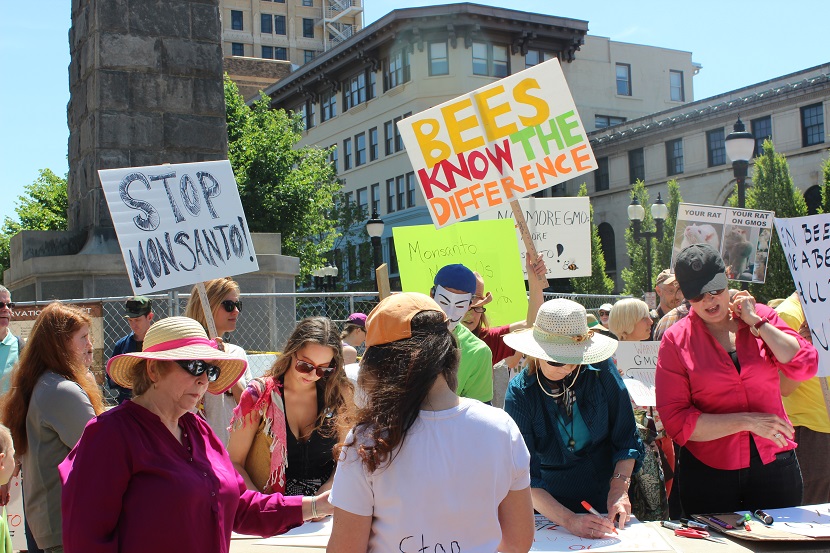
I wore my Non-GMO Project button & displayed my finished sign to the street.
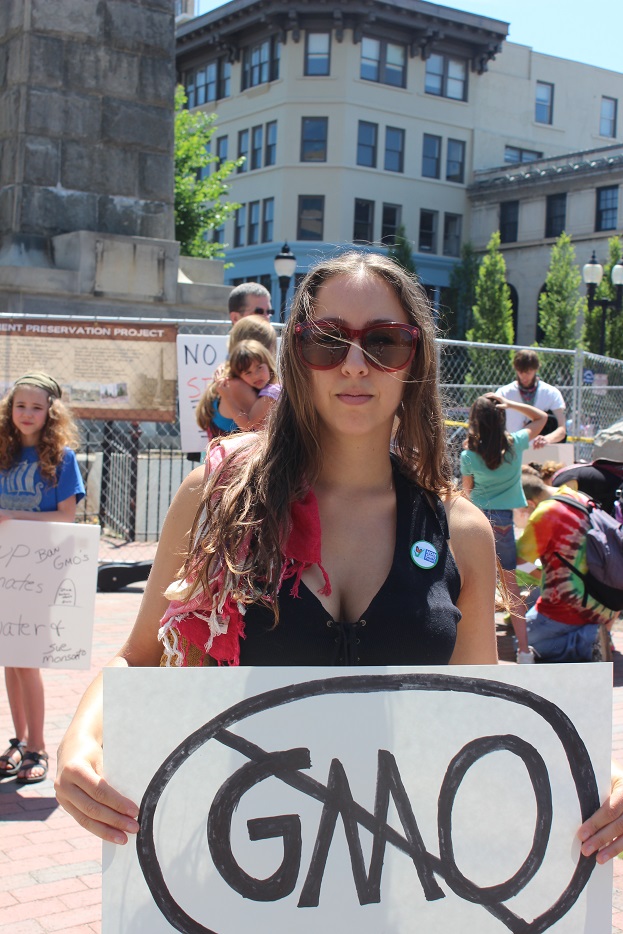
Can you spot me in the crowd below?
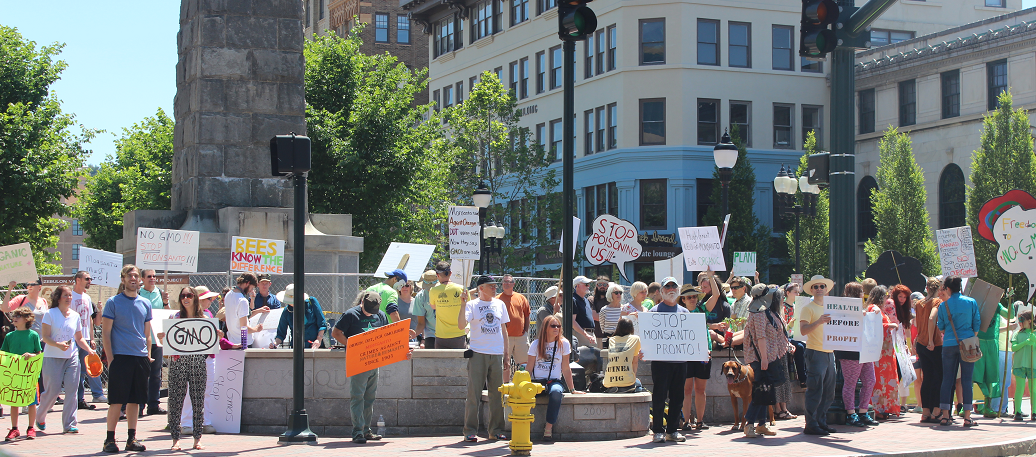
We paraded over the sidewalks on a wide loop through some of the busiest areas of downtown, the police skirting us from all angles, as if eagerly awaiting a breach of law.
Two people with megaphones called out to the city-
“We are not a science experiment.”
“Just put a label on it.”
and prompted the protesters with anthems.
“What do we want?”
crowd “LABELS!”
When do we want them?
crowd “NOW!”
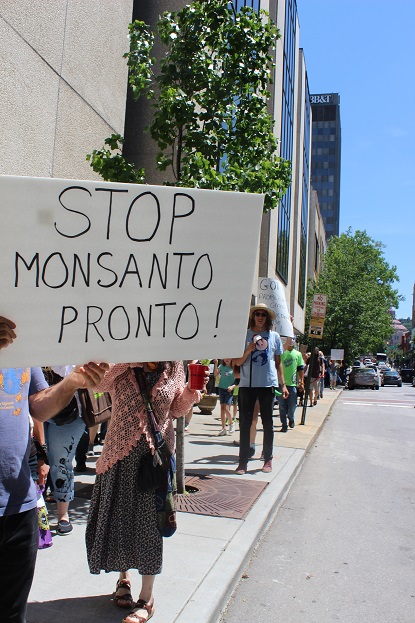

Signs proudly displayed with Basilica of St. Lawrence in the background.

Some protesters made a bold statement by dressing in costume.
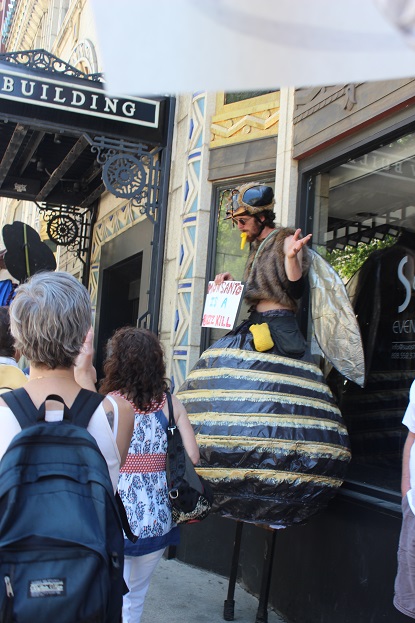
complete with apropos signs that read “MONSANTO IS A BUZZ KILL”
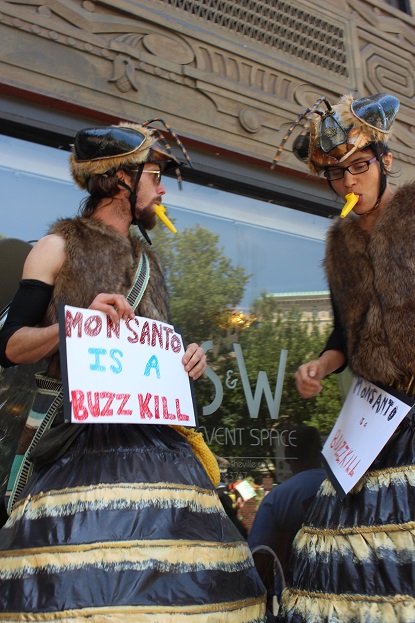
Even this adorable Pitbull got in the spirit.
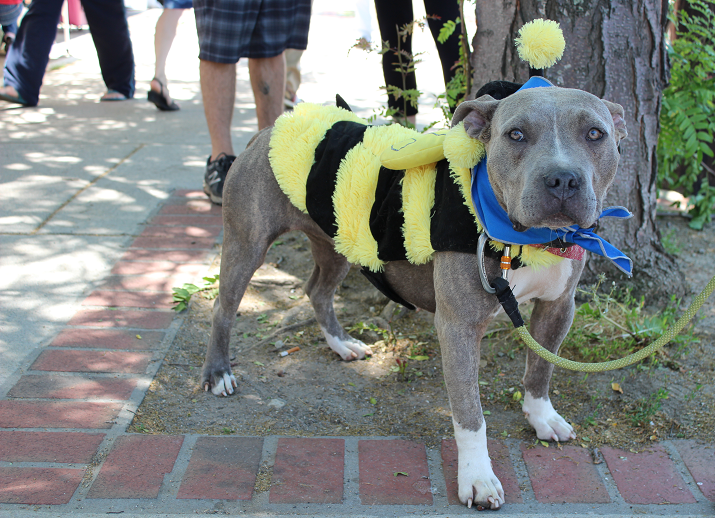
As well as these two trendsetting sisters.
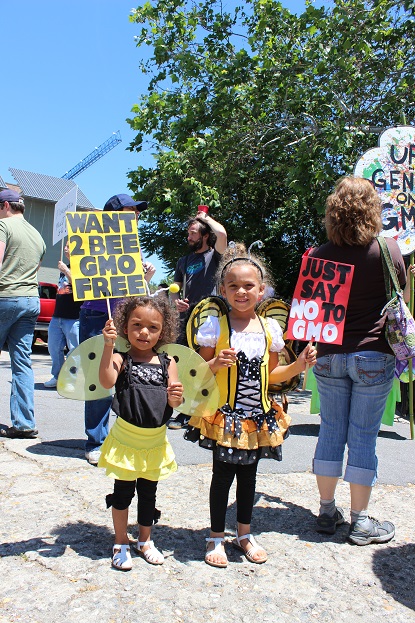
Why should you say no to GMO?
Here is my top 5 list of why you should avoid GMOs at all costs:
1 GMOs increase pesticide/herbicide use. GMO crops are manufactured in a lab to be resistant to certain chemicals, including environmentally damaging pesticides & herbicides. Because of the high levels used, plants and insects are becoming increasingly resistant–creating “super weeds” & “super bugs” so that even more pesticides/herbicides have to be used. It’s a vicious cycle. These chemicals poison the soil & our water supply. A scary fact: The use of Roundup (an herbicide created and owned, not surprisingly, by the same company that is behind the GMOs, Monsanto) has increased 15 times since the introduction of GMOs.
2 GMOs increase cancer risk. With the steady increase of pesticide/herbicide use, this is not surprising. Consuming these toxins can only have a toxic effect on the human body. Another contributor is Monsanto’s GE (genetically engineered) growth hormone (rBGH or rBST) that’s given to cows and has been linked to rising cancer rates. For those of who say organic food is too expensive, well cancer is a lot more expensive (and then some). Buying organic (and thus avoiding GMOs) is an investment in your & your children’s health for the long-term.
3 GMOs reduce bio-diversity. Instead, they create an unsustainable monoculture. In a monoculture the soil is depleted of nutrients & pests & weeds become increasingly resistant while the crops themselves are more vulnerable to pests, diseases, etc. And GMOs don’t just keep to themselves, they consistently cross contaminate organic crops.
4 GMOs may be contributing to the rising percentage of food allergies, autism, digestive disorders, etc. Though as of yet there have been no conclusive studies, there are many speculations and correlations are definitely there as these & other health problems have increased since GMOs were introduced into the food supply.
5 GMOs contribute to the decline of bee populations. With such an increased use of pesticides on GMO crops, this is also invariably linked to killing the bees. Bees have been dying off at an alarming rate since 2006. But what does this mean for our food supply? Bees pollinate a huge amount of the world’s food so in short, no bees = no food.
FYI- these are the most prevalent GMO crops grown today: corn, canola, soy, sugar beets, afalfa, cotton, papaya, zucchini, summer yellow squash
This list is not exhaustive as many food additives are also derived from GMOs and others are in the works.
Currently, there is a fight going on to stop GMO salmon from being introduced to the market.
What I’d like for you to take away from this article:
Remember, you vote with your wallet.
Peaceful protests are are great because they raise awareness, but more than anything else you have to practice what you preach if there is to be any real change within the food industry. If you don’t want these “foods” to reach your table the answer is simple: don’t buy them.
Read food labels carefully for hidden ingredients & purchase organic food whenever possible. Food labeled “organic” cannot contain any GMOs according to USDA law. If it’s not organic, look for the Non-GMO Project VERIFIED seal that looks like this:
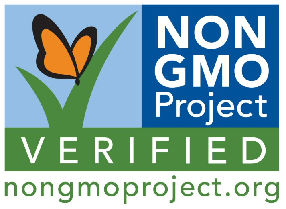
And don’t forget about your furry friends either– they too can be negatively impacted by a diet that’s full of GMOs.
Please share this article with anyone you know that might like to learn more about genetically modified organisms in their food and what they can do about it.
Now I would love to hear from you. Tell me in the comments below: Did you participate in the international March Against Monsanto? Do you avoid GMOs? Why or why not?

What s great article!!!! You did a fantastic job as well as outstanding photos. The GMO’s are scary and you did a superb job enlightening people.
Thank you! they are scary indeed!
Very informative & deeply concerning–glad you fight for what you believe so strongly in–go, Stella Deer!!
happy you found it informative!
This was a fun day, and so nice to bee around so many people who are concerned about our health and the health of our environment! Fabulous article, thanks 🙂
I agree! so fun! definitely a unique experience